Plot
Mary Fanshawe (Fay Wray) is a dedicated, professional supervising nurse in an urban hospital. She is very friendly with one resident, Dr. Preston (Walter Byron), although it is clear that she is not his sole object of attention. Fanshawe reprimands one young nurse, Doris Andros (Mary Carlisle) for her careless attitude, but she is unaware that Andros and Preston are seeing one another in secret. Fanshawe is far less friendly with young Dr. Jim Barclay (Ralph Bellamy) despite his attentions toward her. Barclay, though, is also distracted by tensions with his superior, Dr. Walter Selby (Walter Connolly), who rejects the younger man's suggestions of trying more modern medical and surgical techniques.
During a crucial operation that Selby had insisted on performing himself, he finds himself unable to continue and hands the procedure to Barclay, who succeeds with a radically new technique, calmly observed by Fanshawe, who is acting as head nurse. Selby is forced to concede that his own time as a lead surgeon and hospital head has passed. Later, when a patient nearly commits suicide because of a mistake made by Andros, Barclay discovers the nurse with Preston, who was supposed to be on rounds in the ward, together on the hospital's rooftop.
Barclay attempts to cover for his fellow doctor, but when Andros learns she is to be fired, she threatens to expose the deceit. In the end, both Andros and Preston are forced to leave, with Fanshawe and Barclay now ready to collaborate both professionally and personally.
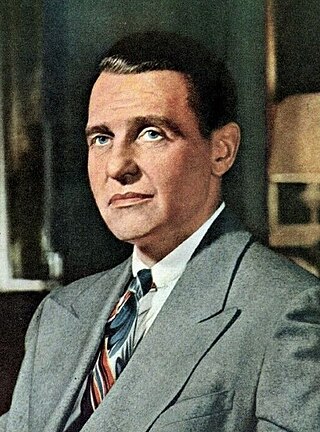
Ralph Rexford Bellamy was an American actor whose career spanned 65 years on stage, film, and television. During his career, he played leading roles as well as supporting roles, garnering acclaim and awards, including a Tony Award for Best Actor in a Play for Sunrise at Campobello as well as Academy Award for Best Supporting Actor nomination for The Awful Truth (1937).

Sad Cypress is a work of detective fiction by British writer Agatha Christie, first published in the UK by the Collins Crime Club in March 1940 and in the US by Dodd, Mead and Company later in the same year. The UK edition retailed at eight shillings and threepence (8/3) – the first price rise for a UK Christie edition since her 1921 debut – and the US edition retailed at $2.00.
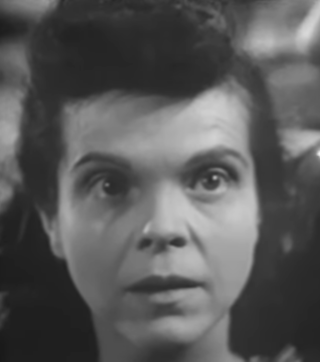
Dorothy I. Adams was an American character actress of stage, film, and television.
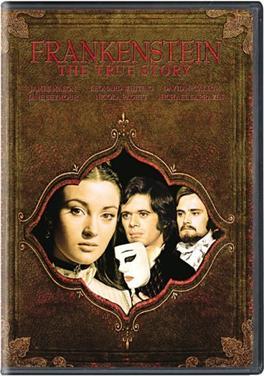
Frankenstein: The True Story is a 1973 British made-for-television film loosely based on the 1818 novel Frankenstein; or, The Modern Prometheus by Mary Shelley. It was directed by Jack Smight, and the screenplay was written by novelist Christopher Isherwood and his longtime partner Don Bachardy.
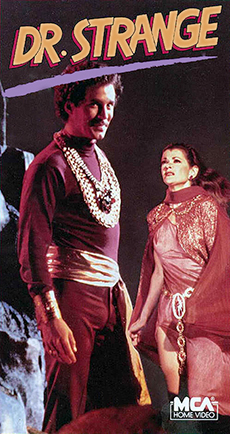
Dr. Strange is a 1978 American superhero television film based on the Marvel Comics fictional character of the same name, co-created by Steve Ditko and Stan Lee. Philip DeGuere directed the film and wrote it specifically for television, and produced the film along with Alex Beaton and Gregory Hoblit. Stan Lee served as a consultant on the film, which was created as a pilot for a proposed television series. Dr. Strange stars Peter Hooten in the title role, along with Jessica Walter, Eddie Benton, Clyde Kusatsu, Philip Sterling, and John Mills. The film aired on September 6, 1978, in a two-hour block from 8pm to 10pm on CBS, the same network that, at that time, aired The Amazing Spider-Man and The Incredible Hulk; CBS did not pick up Dr. Strange as a series.

"Kaleidoscope in "K"" is a novella by author A. J. Cronin, initially published in 1933 in Cosmopolitan magazine. All of the action unfolds within twelve hours in a London hospital, and the story centres around the conflict between a young surgeon, Dr. Barclay, and the hospital chief, Dr. Selby. A subplot is the rivalry between Barclay and a playboy physician, Dr. Preston, as they vie for the attentions of Miss Fanshawe, an attractive nurse. The story comes to a tense climax as Barclay prepares for a delicate brain operation, a revolutionary procedure to which Selby is opposed. The story was also printed in book form by various publishers, and it was also adapted into a 1934 film, Once to Every Woman.
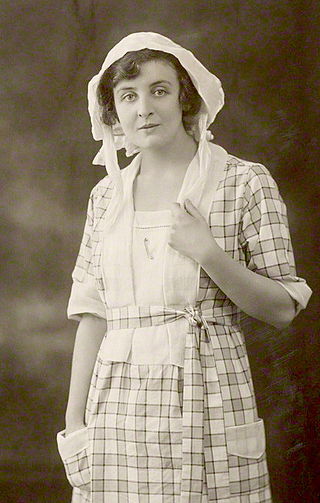
Hessy Doris Lloyd was a British actress. She appeared in The Time Machine (1960) and The Sound of Music (1965).

Life Begins is a 1932 American pre-Code drama film starring Loretta Young, Eric Linden, Aline MacMahon, and Glenda Farrell. The film was adapted from the 1932 play of the same name by Mary M. Axelson. It was released by Warner Bros. on September 10, 1932. The film was praised for its honest portrayal of a maternity ward.

Dead of Night is a British television anthology series of supernatural fiction, produced by the BBC and broadcast on BBC2 in 1972 over seven 50-minute episodes.
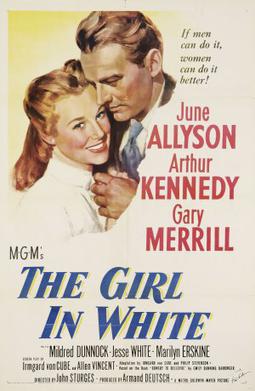
The Girl in White is a 1952 American drama film directed by John Sturges and starring June Allyson, Arthur Kennedy and Mildred Dunnock. It is based on the memoirs of the pioneering female surgeon Emily Dunning Barringer.
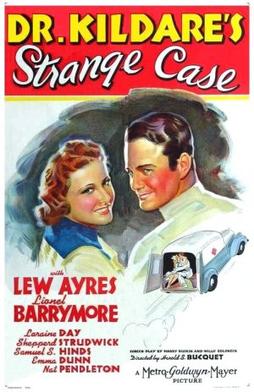
Dr. Kildare's Strange Case is a 1940 American drama film directed by Harold S. Bucquet. This was the fifth of a total of ten Dr. Kildare pictures. Horace MacMahon joined the cast regulars in the series as taxi driver "Foghorn" Murphy.
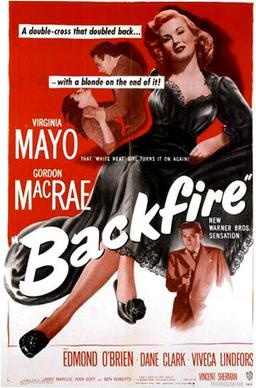
Backfire is a 1950 American film noir crime film directed by Vincent Sherman starring Virginia Mayo and Gordon MacRae, with Edmond O'Brien, Dane Clark, and Viveca Lindfors in support.
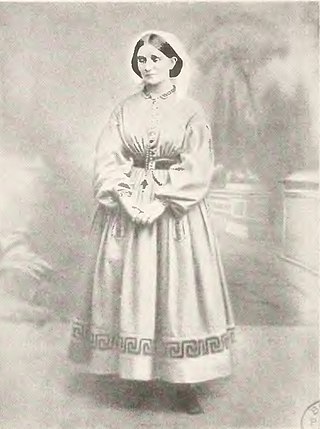
Helen L. Gilson was born in Chelsea, Massachusetts. She was a nurse during the Civil War. Also known as Helen L. Gilson Osgood.

Fay Helm was an American film actress. Born in Bakersfield, California, she appeared in about 65 films between 1936 and 1946. She is perhaps better known for films like A Child is Born (1939), The Wolf Man (1941), Phantom Lady (1944), Lady in the Dark (1944) and Sister Kenny (1946).
The Great Hotel Murder is a 1935 American mystery film directed by Eugene Forde and starring Edmund Lowe, Victor McLaglen, Rosemary Ames and Mary Carlisle. It is based on Recipe for Murder a 1934 story by Vincent Starrett.
Ladies of Washington is a 1944 American drama film directed by Louis King and starring Trudy Marshall, Ronald Graham and Anthony Quinn.

Smashing the Spy Ring is a 1938 American drama film, directed by Christy Cabanne. It stars Ralph Bellamy, Fay Wray, and Regis Toomey, and was released on December 29, 1938.
Condominium is a 1980 American two-part, four-hour made-for-television disaster film starring Barbara Eden, Dan Haggerty and Steve Forrest and featuring an ensemble cast of well-known television actors, including Ana Alicia, Richard Anderson, Ralph Bellamy, Larry Bishop, Macdonald Carey, Dane Clark, Linda Cristal, Elinor Donahue, Don Galloway, Pamela Hensley, Arte Johnson, Jack Jones, Dorothy Malone, Mimi Maynard, Lee Paul, Nehemiah Persoff, Nedra Volz, Carlene Watkins and Stuart Whitman.

"The Defender" is an American television play broadcast live in two parts on February 25, 1957, and March 4, 1957, as part of the CBS television series Studio One. A courtroom drama, it was written by Reginald Rose and directed by Robert Mulligan. The cast included Ralph Bellamy and William Shatner as a father-son defense team, Steve McQueen as the defendant, and Martin Balsam as the prosecutor. Rose later spun off the concept into a full series entitled The Defenders, starring E.G. Marshall and Robert Reed in Bellamy and Shatner's roles.
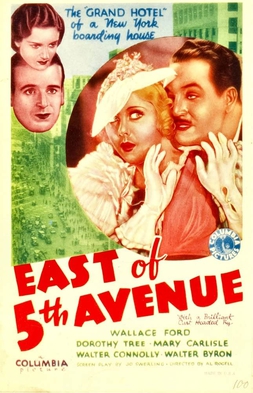
East of Fifth Avenue is a 1933 American pre-Code drama film directed by Albert S. Rogell and starring Wallace Ford, Mary Carlisle and Dorothy Tree. It was produced and distributed by Columbia Pictures. The plot revolves around the inhabitants of a cheap New York boarding house.

















